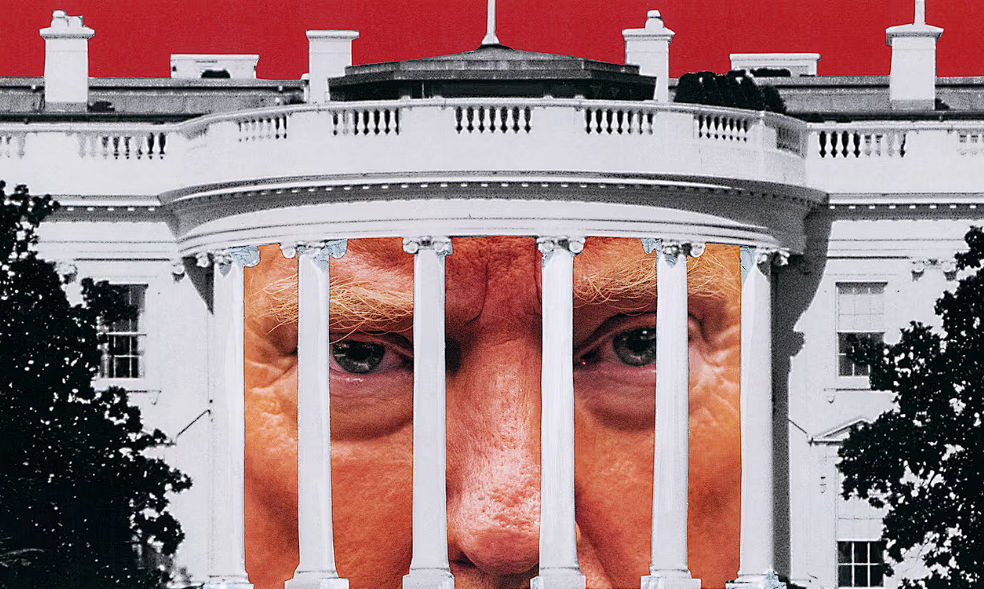Losing an election for the highest office is a devastating blow that no candidate can forget. But for Donald Trump, the stakes in the upcoming election are much higher. His fate lies between the possibility of continuing as president or facing the threat of imprisonment.
If Trump claims victory, he will become the first convicted criminal to win the presidency and have access to the nuclear codes. However, if he falls short, the 78-year-old tycoon could potentially face embarrassing courtroom trials and even time behind bars. This could mark the end of a life in which he has managed to escape the clutches of the law and evade accountability.
Tuesday will be a significant day for Trump.

Trump has cultivated an image of being someone who gets away with everything. Gwenda Blair, a Trump biographer, says that if he loses, he will face numerous moments of reckoning. Trump is at risk of going to jail, and he could also lose a significant portion of his wealth. Moreover, regardless of the election outcome, there will be concerns regarding his health, as no one can avoid death, ill health, or even dementia.
Throughout his career, Trump has pushed the ethical and legal boundaries, facing countless investigations, court battles, and hefty fines. His life has been marked by scandal on an enormous scale.
In the 1970s, Trump and his father were sued by the justice department for racial discrimination after refusing to rent apartments to black people in predominantly white buildings. His property and casino businesses, including the Taj Mahal and Trump Plaza, filed for bankruptcy multiple times in the 1990s and early 2000s.
Trump University, a business offering property training courses, faced numerous lawsuits for fraudulent practices, misleading marketing, and false claims about the quality of its programs. In 2016, Trump settled for $25 million without admitting any wrongdoing.
The Donald J Trump Foundation, a charitable organization, was investigated and sued for allegedly using charitable funds for personal and business expenses. Eventually, Trump agreed to dissolve the foundation, with the remaining funds going to charity.
In a New York civil fraud trial, Trump and his company were ordered to pay more than $350 million for artificially inflating his net worth to secure favorable loan terms. He is also known for paying little to no federal income taxes in specific years, which, although technically legal, is seen by some as bordering on unethical.
But despite all of this, Trump became a celebrity, appearing in New York’s tabloids and hosting his reality TV show, The Apprentice. He projected an image of enormous success, despite many of his endeavors being unsuccessful, thanks in part to his father bailing him out.

Trump’s personal life is also riddled with scandal. He has reportedly cheated on all three of his wives, and more than two dozen women have come forward with accusations of sexual misconduct against him. Trump’s vulgar comments about women were exposed in the infamous Access Hollywood tape during the 2016 election campaign. He bragged about grabbing women’s private parts, saying, “When you’re a star, they let you do it. You can do anything.” In 2020, a jury found Trump liable for sexually abusing columnist E Jean Carroll in 1996, resulting in a $5 million award against him.
During his presidency, Trump’s ethical shortcomings continued. He made over 30,000 false or misleading claims within four years, according to a count by The Washington Post. He became the first president in history to be impeached twice, first for withholding military aid to pressure Ukraine’s government into investigating his political opponents, and then for inciting an insurrection on January 6, 2021, following his election defeat. Trump also became the subject of multiple criminal cases, any one of which would have been enough to derail the chances of any other presidential hopeful.
In May, Trump was found guilty of 34 counts of falsifying business records related to hush-money payments to adult film performer Stormy Daniels. He became the first former president to be convicted of felony crimes. Sentencing is scheduled for November 26th.

Trump’s legal troubles should have been a significant theme in the 2020 election campaign, but they seemed to fade into the background. Some believe that focusing on criminal convictions was overshadowed by the greater threat of a potential fascist regime.
Trump has managed to portray himself as a victim, turning each indictment into a badge of honor. He claims that Democrats are the real threat to democracy, positioning himself as the one standing in their way. This narrative has resonated with his supporters, resulting in an increase in his poll numbers after each indictment.
Despite this, there are those who believe that Trump’s criminal past should have been highlighted more by his opponents. Moe Vela, a lawyer and former senior adviser to Biden, thinks it was a missed opportunity to downplay Trump’s criminal history. He believes that emphasizing Trump’s status as a convicted felon should have been an obvious tactic.
The outcome of the election will determine whether Trump’s lucky streak continues. If he wins, he is expected to use his power to squash the ongoing cases against him. However, if Vice President Kamala Harris defeats him, Trump’s legal problems will loom large once again.
Regardless of the election result, it is important that the judicial system takes these cases seriously and holds Trump accountable. No one in this country is above the law, not even a former president.



